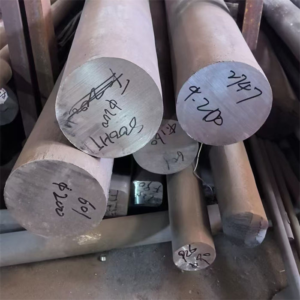Get in touch with us
Leave a message
Nickel Alloy Bars are high-performance materials prized for their remarkable strength, corrosion resistance, and ability to perform in extreme conditions. As a top-tier manufacturer in China, our factory produces Nickel Alloy Bars and Rods using nickel-based alloys enriched with elements like chromium, molybdenum, and iron. These bars outshine conventional metals like steel in harsh environments, making them a preferred choice for industries worldwide. From Inconel 625 Round Bars to UNS N08020 components, our Nickel Alloy Bars offer durability and versatility for your toughest applications.

Nickel Alloy Bars meet stringent standards and are available in a variety of grades:
These specs ensure every Nickel Alloy Bar delivers reliable performance, verified through industry-standard testing.
Nickel Alloy Bars come in diverse dimensions, with customization to fit your needs:
This range ensures Nickel Alloy Rods suit everything from small fasteners to large structural components.
Nickel Alloy Bars are available in multiple forms, crafted with advanced processes and finishes:
For example, an Inconel 718 Bar might be cold-drawn for precision, while a Nickel Alloy Rod could be forged for enhanced strength.
| Grade | Key Features | Industry | Specific Uses |
|---|---|---|---|
| Inconel 625 | Corrosion and heat resistance | Aerospace, Marine | Turbine blades, exhaust systems |
| Inconel 718 | High strength, fatigue resistance | Aerospace, Oil & Gas | Jet engine parts, downhole tools |
| Alloy 20 | Acid resistance, durability | Chemical, Food Processing | Valve stems, reactor components |
| Monel 400 | Seawater corrosion resistance | Marine, Desalination | Pump shafts, seawater piping |
| Hastelloy C276 | Broad chemical resistance | Petrochemical | Heat exchangers, pressure vessels |
A:A nickel alloy bar, such as Inconel or Monel, is a high-strength, corrosion-resistant bar made from nickel and elements like chromium or copper, ideal for extreme environments in aerospace, marine, and chemical industries.
A:Nickel alloy bars, like Inconel 718, often surpass stainless steel in high-temperature strength and corrosion resistance, though stainless steel is more affordable for general use.
A:No, 316 is a stainless steel grade with some nickel (10-14%), but it’s not a true nickel alloy. Nickel alloy bars, like Monel 400, have a higher nickel content (over 60%) for superior corrosion resistance.
A:Nickel alloy bars resist rust exceptionally well due to their high nickel content, forming a protective oxide layer. They’re ideal for marine or acidic environments but may corrode in highly oxidizing conditions.
A: Nickel alloy bars are expensive and harder to machine due to their strength. They may also be prone to stress corrosion cracking in specific environments, requiring careful application and maintenance.
A: Clean nickel alloy bars with mild soap and water, using a soft cloth to avoid scratching. For tougher stains, use a non-abrasive cleaner or vinegar solution, then rinse and dry thoroughly to maintain their finish.

Professional manufacturer of premium specialty alloys, offering stainless steel, Hastelloy, nickel-based alloys and processing services. Delivering superior metallurgical solutions for aerospace, petrochemical, marine engineering and other demanding industries.